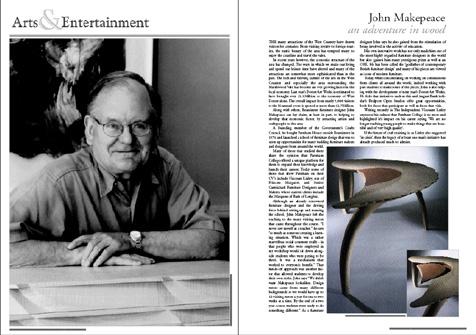
3 minute read
John Makepeace By Fergus Byrne - August 05
August 2005
John Makepeace an adventure in wood
Advertisement
THE many attractions of the West Country have drawn visitors for centuries. From visiting royalty to foreign tourists, the rustic beauty of the area has tempted many to enjoy the coastline and travel the vales.
In recent years however, the economic structure of the area has changed. The ways in which we make our living and spend our leisure time have altered and many of the attractions are somewhat more sophisticated than in the past. The rich and thriving culture of the arts in the West Country and especially the area surrounding the Marshwood Vale has become an ever growing factor in the local economy. Last year’s Dorset Art Weeks is estimated to have brought over £1.1Million to the economy of West Dorset alone. The overall impact from nearly 9,000 visitors to the bi-annual event is quoted as more than £2.7Million.
Along with others, Beaminster furniture designer John Makepeace can lay claim, at least in part, to helping to develop that economic factor, by attracting artists and craftspeople to the area.
A founding member of the Government’s Crafts Council, he bought Parnham House outside Beaminster in 1976 and launched a school of furniture design that was to open up opportunities for many budding furniture makers and designers from around the world.
Many of those that studied there share the opinion that Parnham College offered a unique platform for them to expand their knowledge and launch their careers. Today some of those that show Parnham on their CV’s include Viscount Linley, son of Princess Margaret, and Senior Carmichael Furniture Designers and Makers, whose current clients include the Marquess of Bath of Longleat.
Although an already renowned furniture designer and the driving force behind setting up and running the school, John Makepeace left the teaching to the many visiting tutors that came throughout the course. “I never saw myself as a teacher,” he says “so much as someone creating a learning situation. Which was
a rather marvellous social comment really—in that people who were employed in my workshop would sit down alongside students who were paying to be there. It was a mechanism that worked to everyone’s benefit.” That hands-off approach was another factor that allowed students to develop their own styles. John says “We didn’t want Makepeace lookalikes. Design tutors came from many different backgrounds so we would have up to 12 visiting tutors a year for one to two weeks at a time. By the end of a two year course students were ready to do something different.” As a furniture designer John says he also gained from the stimulation of being involved in the activity of education.
His own innovative work has not only made him one of the most highly regarded furniture designers in the world but also gained him many prestigious prizes as well as an OBE. He has been called the ‘godfather of contemporary British furniture design’ and many of his pieces are viewed as icons of modern furniture.
Today, while concentrating on working on commissions from clients all around the world, indeed working with past students to make some of the pieces, John is also helping with the development of next year’s Dorset Art Weeks. He feels that initiatives such as this and August Bank holiday’s Bridport Open Studios offer great opportunities, both for those that participate as well as those that visit.
Writing recently in The Independent, Viscount Linley expressed his sadness that Parnham College is no more and highlighted it’s impact on his career saying ‘We are no longer teaching young people to make things that are beautiful and of very high quality’.
If the future of craft training is, as Linley also suggested ‘in crisis’, then the legacy of at least one man’s initiative has already produced much to admire.










